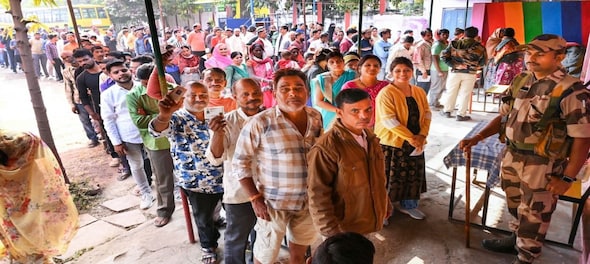
The Congress-led Opposition continues to stir the political cauldron suggesting that wherever the party forms a government, its first task will be to count the people according to their caste.
Latest assertion on the issue came from former Congress president Rahul Gandhi during his campaigning in Rajasthan and it takes further the demand he and other party leaders have been talking of. On the other hand, the Bharatiya Janata Party, which is heading the government at the Centre and several states, is yet to formulate a formal position on the issue.
This contrast stands out significantly and is playing out in the current round of campaigning underway in the assembly elections. The Congress, which hopes to retain its governments in Chhattisgarh and Rajasthan, and claw back in Madhya Pradesh is whipping it into a poll issue.
In Chhattisgarh, Congress included the promise as a 'To Do' task in its manifesto while in October, the Ashok Gehlot government in Rajasthan moved the pieces on the board to hold a caste census.
The promise of caste census the Congress leaders have started talking, simply takes forward the party’s collective resolve that finds mention in the Raipur Declaration. The basic philosophy was that the nation’s resources should be better targeted and allocated to those communities and castes, which have remained at the bottom-end of the economic ladder. Affirmative action should be re-oriented for all round progress.
Ever since the Bihar government headed by Nitish Kumar declared the results of the caste survey, there has been a clamour in several states – Karnataka, Rajasthan, Odisha and Maharashtra to hold a similar exercise.
In fact, some of the allies in the BJP-led National Democratic Alliance like Suheldev Bharatiya Samaj Party or the Apna Dal (Sone Lal), which owe its political presence to strong caste-based support, are unsurprisingly in favour of such a census.
Prime Minister Narendra Modi was the first to join issue with the Congress over its constant chant on caste census. His charge was that the move is aimed to divide the society and sought to portray poverty as the biggest malaise that needs to be cured. The Congress leaders lost little time in launching a counter.
Also Read: As Bihar, Centre spar over caste census, find out the difference between census and survey
While verbal duels and rhetoric especially during high-octane election campaigns is understandable, the sensitivity around the issue is too deep and cannot be ignored. The current round of elections and its outcome can an indicator of how people of the three Hindi-heartland states of Chhattisgarh, Madhya Pradesh and Rajasthan view this aspect. This even though the number of tribal people spread across these states is high.
The closest the BJP could offer a glimpse of its thoughts on the issue was when Union Home Minister Amit Shah said the party was not opposed to the idea but would offer a stance by consultation and thinking it through.
Over the past two decades, the BJP gradually built its acceptance among other backward classes (OBCs) by grooming and promoting party workers from some of these communities to leadership positions.
The party carefully crafted a policy of outreach to OBC sections and chipped away the image of the BJP being a party of the upper castes identified as Brahmin-Bania. Results of the last two general elections, especially the one held in 2019 reflected the amount of trust sections of OBCs placed in the BJP and PM Narendra Modi. This was pronounced in states like UP, once considered the cauldron of Mandal politics, along with that of Bihar.
For a party that is assiduously working to consolidate the majority community vote as against the caste factor, the BJP would find resurgence of a debate around traditional lines disadvantageous in terms of electoral politics. The BJP's accent has been on holistic social justice and grants benefits to those at the lower end of the economic strata. Yet, caste remains an important factor in Indian politics and the undeniable fact is that all political parties take this into account while picking up a candidate with best chances to win in the elections.
The Rashtriya Swayamsevak Sangh, the BJP’s ideological mentor has been promoting the concept of ‘Samajik Samrasta (social harmony) and working on programmes to bring this about in a diverse society peppered with different castes. A project to raise awareness against caste discrimination and untouchability is being rolled out which can be viewed as a work to counter the impact on the people on account of the caste survey demand.
Some view this demand having the potential to be the anti-dote to the BJP’s Hindutva while another section visualise this could usher in an era of Mandal 2.0. Clearly, the caste census survey is a genie that is out of the bottle. Sooner than later, the BJP will have to declare its position on the issue which has the potential to influence voters when they turn up at the polling booths during the general elections next summer.
— The author, K V Prasad, is a senior journalist and has earlier worked with The Hindu and The Tribune. Views expressed are personal.
Read his previous articles here
(Edited by : C H Unnikrishnan)
First Published: Nov 21, 2023 10:02 AM IST
Check out our in-depth Market Coverage, Business News & get real-time Stock Market Updates on CNBC-TV18. Also, Watch our channels CNBC-TV18, CNBC Awaaz and CNBC Bajar Live on-the-go!


Supreme Court dismisses plea seeking postponement of CA exams; details here
Apr 29, 2024 2:29 PM
Just 8% women candidates contested first two phases of Lok Sabha polls
Apr 29, 2024 12:00 PM
The sexual assault case against Prajwal Revanna — here's what we know so far
Apr 29, 2024 11:36 AM
Repolling underway at one polling booth in Chamarajanagar LS segment in Karnataka
Apr 29, 2024 10:32 AM

